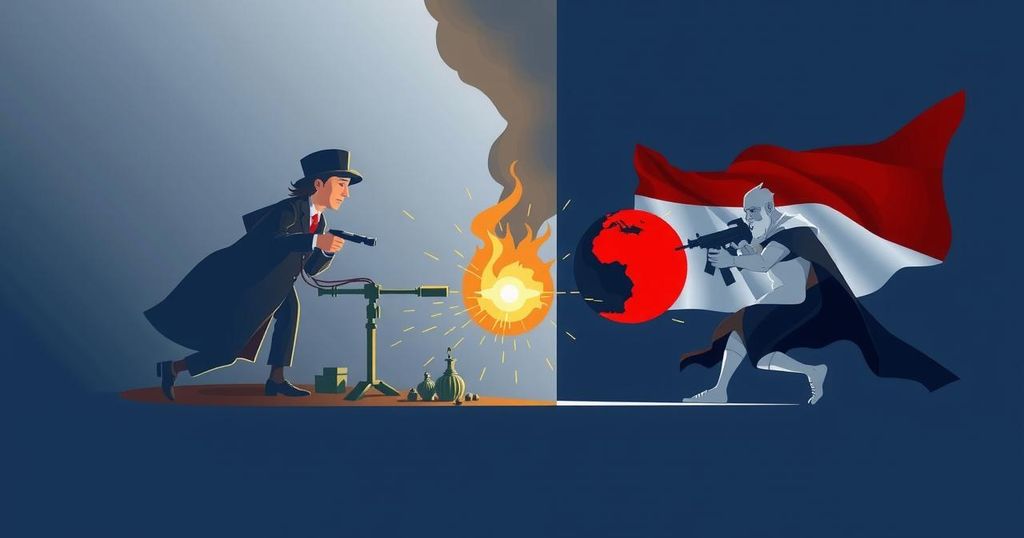Senior US officials are in Israel and Egypt to negotiate ceasefires in Gaza and Lebanon amidst rising tensions and violence. The delegation includes CIA Director William Burns. Recent hostilities have resulted in significant casualties, and a proposed US-drafted ceasefire could establish a temporary cessation of fighting in Lebanon. However, Gaza negotiations are still unresolved. International diplomatic efforts emphasize the urgency of finding resolutions as the situation evolves.
Senior officials from the United States, including CIA Director William Burns, have recently visited Israel and Egypt with the objective of advancing efforts toward ceasefires in both Gaza and Lebanon. During his meeting in Cairo with Egyptian President Abdel Fattah El Sisi, Director Burns assessed strategies for achieving a ceasefire in Gaza and discussed a potential arrangement for hostages and prisoners between Israel and Hamas. US diplomatic envoys Brett McGurk and Amos Hochstein have also arrived in Israel, with Mr. McGurk focusing on the Gaza situation while Mr. Hochstein addresses the need for a ceasefire in Lebanon, particularly in light of an emergent draft agreement aimed at halting hostilities between Israel and the Iran-backed Hezbollah group. White House Press Secretary Karine Jean-Pierre affirmed that the envoys would engage in discussions regarding various issues, including hostages, Iran relations, and broader regional border concerns. This marks the latest phase of US diplomatic endeavors, alongside Egypt and Qatar, to mediate a resolution to the ongoing conflicts. Notably, Secretary of State Antony Blinken recently made his eleventh visit to the region in a year, emphasizing the urgency of these high-level diplomatic initiatives as the US election approaches. The conflict landscape has seen escalated violence stemming from Hamas’s attack on Israel on October 7, 2023, which resulted in substantial casualties and the capture of hostages. Subsequently, Hezbollah’s activities from Lebanon have intensified the situation, leading to a concerning death toll exceeding 43,100 in Gaza and around 2,800 in Lebanon over the past year. A US-drafted ceasefire proposal, reported by Israeli public broadcaster Kan, puts forth a 60-day cessation of hostilities allowing for the deployment of Lebanese Army forces to replace Hezbollah in southern Lebanon, thus enhancing the security environment along the border with Israel. This proposal anticipates an increase in the number of Lebanese soldiers and a withdrawal of Israeli troops. After this interim period, the US and other international stakeholders would facilitate indirect negotiations aimed at full implementation of UN Resolution 1701 and the resolution of outstanding border disputes Simultaneously, ceasefire negotiations for Gaza remain unresolved, with recent talks in Doha yielding no breakthrough. Gershon Baskin, an Israeli former hostage negotiator, emphasized the necessity for both the Israeli government and Hamas to recognize that a resolution cannot occur amidst ongoing hostilities. He suggested that Qatar and Egypt should exert pressure on Hamas to hand over governance of Gaza to a civilian body, promoting political stability and humanitarian alleviation in the region.
The current geopolitical climate in the Middle East is characterized by heightened tensions and ongoing armed conflicts primarily involving Israel, Gaza, and Lebanon. The escalation of violence began following Hamas’s significant attack on Israel in early October 2023. The subsequent retaliatory actions by Israel and the involvement of Hezbollah have resulted in devastating humanitarian crises in Gaza and Lebanon. Various international players, particularly the United States, Egypt, and Qatar, are actively engaged in diplomatic efforts to engineer ceasefires and negotiations aimed at resolving these conflicts. Efforts include addressing complex humanitarian issues, hostages, and the legitimacy of armed groups like Hamas and Hezbollah with respect to their governance and actions. The backdrop of these negotiations is the long-standing resolution attempts symbolized by UN Resolution 1701, which remains inadequately implemented since its adoption in 2006.
In summary, high-ranking US officials are intensifying diplomatic measures to negotiate ceasefires in Gaza and Lebanon amid a backdrop of severe conflict and humanitarian strife resulting from recent escalations. The involvement of key figures such as CIA Director Burns and their meetings with regional leaders are pivotal steps toward reaching meaningful agreements. While the situation in Lebanon may yield quicker resolutions, ongoing negotiations regarding Gaza remain fraught with complexity, underscoring the necessity for continued international involvement and regional cooperation to foster peace and stability.
Original Source: www.thenationalnews.com







